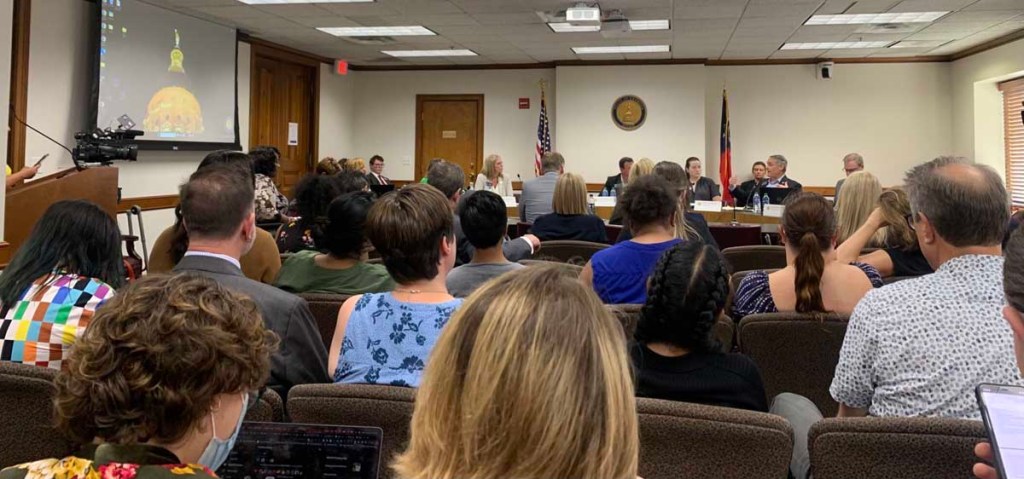Crowded room speaks against bill restricting teacher talks about gender identity
Published 2:35 pm Wednesday, August 23, 2023

- Approximately 40 people signed up to speak at the Senate Committee on Education and Youth meeting Aug. 23 on Senate Bill 88, a controversial proposal that stalled during the 2023 legislative session.
ATLANTA — A tearful father of a transgender teen was among dozens who spoke against the “Parents and Children Protection Act of 2023” before a crowded Senate committee room on Aug. 23.
If approved, the bill would require written consent from parents or guardians of children under 16 in order for teachers to discuss topics of “sensitive nature.” The proposed legislation defines “sensitive nature” as sex education and programs providing sex education, and information regarding a child’s sexual orientation or gender identity other than the child’s biological sex.
“Transgender youth are already very vulnerable and different, and schools and society already make them feel that way already,” the emotional father said. “Instead of stigmatizing these children, and these kids, we should be lifting them up and supporting them so they can succeed in life.”
The bill would apply to adults acting “in loco parentis,” or adults exercising control over a child as a caregiver or pursuant to the performance of services as a member of the staff all public, private and charter schools, social services agencies and camps.
Marjorie Pach, a mother of two public school students, said her teen son has several friends who are transgender, queer or non-binary.
“None of these kids learn to be transgender from a teacher and bills like this won’t stop kids from being transgender,” Pach said. “(SB 88) claims to be about parents’ rights, but it ignores parents like me who simply want to love and support our kids and who would like school to be a place where they’re protected from bigotry rather than laid open to it.
She added: “By turning gender identity into a taboo subject at school, it could have the disastrous effect of isolating and silencing a child in distress. All of this harm is unnecessary.”
Nearly 40 people signed up to speak at the Senate Committee on Education and Youth meeting on Senate Bill 88, a controversial proposal that stalled during the 2023 legislative session.
“If a child indicates a desire to discuss information of a sensitive nature with an adult acting in loco parentis, such adult shall not engage in such discussion without the presence or the express permission of the child’s parents or legal guardian,” the proposal states.
Violations would be subject to sanctions such as the withholding of funds from public and charter schools, and nonprofits could be at risk of forfeiting tax emption status.
Much of the sentiment expressed during public comments suggested that addressing gender and transgender children was not an issue affecting schools.
Several speakers suggested that teachers and other adults may be the only safe place a child may have to express concerns and ask questions regarding gender identity.
Kate Morgan, who identified as a former longterm substitute teacher for public schools, suggested parents who don’t agree with gender topics to enroll their child in private schools or homeschool.
“It’s not my problem as a taxpayer if they don’t agree with what is being taught in public schools,” she said. “I will also add that there are many trans and non-binary and LGBT people, not just in this room, but in the real world and your kids will be interacting with them. So I think it would be better to leave trans kids alone because they are not the problem, bills like this are the problem.”
Sen. Carden Summers, a Cordele Republican, sponsored the bill. He said the bill is not to address gender or “sexual persuasion.”
“Whoever is in charge of the child [at] that time, do not discuss gender with that child. It is not your job to discuss gender with a child, that is the parent or the guardian’s position to do that or a professional,” Summers said. “It’s not the responsibility of the person in charge to teach these kids what they feel is right when it comes to gender. That’s the basic the crux of this bill.”
Tom Rawlings, a child welfare attorney who helped draft the bill, said the bill is purposed to make sure parents aren’t left in the dark about a “very significant change that their children are going through.”
The bill does not specifically state that school district would be able to determine their own policies on gender discussion.
Rawlings said the bill would require public and charter schools to adopt policies regarding gender discussions.
“If the Decatur City Schools (in metro Atlanta) wants to adopt a policy, for example, in which students will have more privacy when they speak to a teacher or counselor regarding gender identity issues they may be involved with, nothing is stopping the school board indicator from doing that,” he said. “But if Decatur County (in South Georgia) if they want to adopt a policy of notifying parents when a child expresses gender incongruence, that’s up to the good people of Decatur County.”
According to the Associated Press, at least 30 school gender identity proposals have been filed in 16 states, and they vary by ages.
Georgia’s Parents and Children Protection Act of 2023 is modeled after Florida’s dubbed “Don’t say gay bill.”
The preface of the Florida law prohibits “classroom discussion about sexual orientation or gender identity,” through grade 12.



